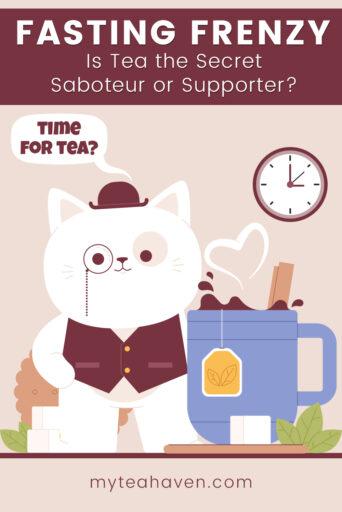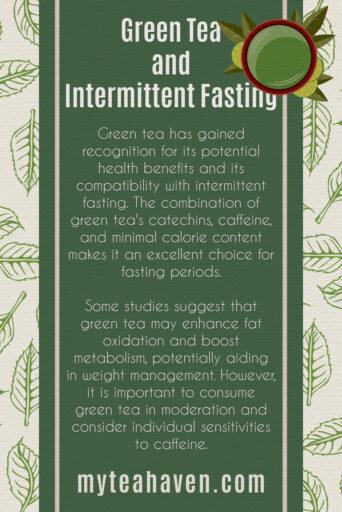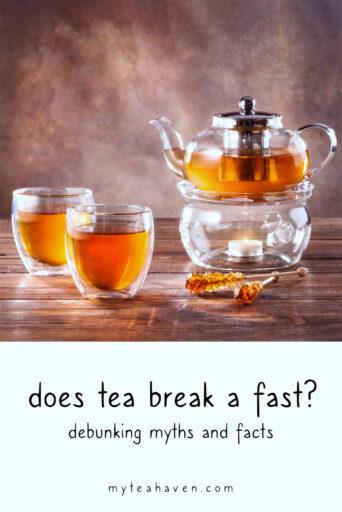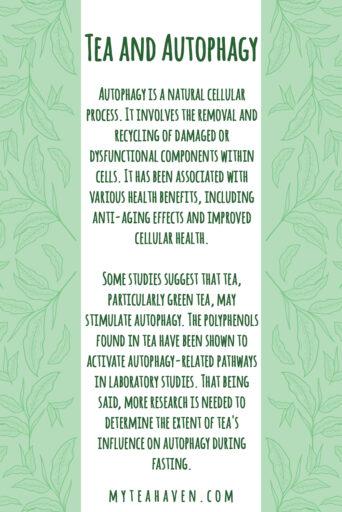Fasting Frenzy: Is Tea the Secret Saboteur or Supporter?
Does Tea Break a Fast?
Fasting has gained popularity in recent years due to its potential health benefits, which include weight management and improved metabolic function. With this trend comes the question: does tea break a fast? Today we will learn more about the intricacies of fasting, explore the components of tea, and provide helpful suggestions to address this burning question.
We are a participant in the Amazon Services LLC Associates Program, an affiliate advertising program designed to provide a means for us to earn fees by linking to Amazon.com and related sites. This post may contain affiliate links which means we may receive a commission, at no cost to you, for purchases made using our links. Please see my disclosure to learn more. Unless otherwise stated, all prices are in US$.
Understanding Fasting
Before we look into the impact of tea on fasting, let’s establish a clear understanding of what fasting entails.
Fasting is the practice of abstaining from consuming food and, in some cases, certain beverages for a specific period. It has been practiced for centuries and can take various forms, including intermittent fasting, water fasting, and juice fasting.

Fasting offers a way to promote physiological changes in the body, such as improved insulin sensitivity and increased autophagy.
What Constitutes a Fast?
To determine whether tea breaks a fast, it is crucial to define the parameters of what breaks a fast in the first place.
A fast is typically defined as abstaining from caloric intake. Therefore, any substance that provides a significant caloric content can be considered as breaking a fast. Certain substances, like black coffee and tea, are often debated due to their minimal calorie content and potential effects on metabolic processes.
The Concept of Breaking a Fast
Breaking a fast refers to the act of consuming something that initiates metabolic responses typically associated with food intake. This includes activating the digestive system, releasing insulin, and shifting the body from a fasted state to a fed state.
The concern arises when individuals who fast are aiming to maximize the benefits of autophagy, ketosis, or fat burning. In such cases, the impact of consuming tea becomes a topic of interest.
Examining Tea and Its Components

To determine the potential impact of tea on fasting, we need to examine its components.
Tea is derived from the Camellia sinensis plant and contains various compounds, including polyphenols, catechins, and caffeine.
These components contribute to tea’s taste, aroma, and potential health benefits. Understanding the composition of tea is crucial in evaluating its impact on fasting.
Does Tea Contain Calories?
One of the primary concerns when it comes to breaking a fast is caloric intake. While tea does contain some calories, the amount is generally negligible. A cup of unsweetened tea typically contains less than 5 calories, which is unlikely to disrupt a fast significantly. That being said, it is important to note that adding milk, sweeteners, or other additives to tea can increase its caloric content and potentially break a fast.
For those who prefer to consume tea during fasting, opting for plain, unsweetened varieties is recommended.
The Impact of Tea on Insulin Levels
Insulin is a hormone produced by the pancreas and plays a crucial role in regulating blood sugar levels and nutrient uptake. One concern surrounding tea consumption during a fast is its potential to increase insulin levels.
Research suggests that tea, especially green tea, may have insulin-regulating properties. Certain compounds in tea, such as catechins, have been shown to enhance insulin sensitivity, potentially aiding in glucose control. Therefore, moderate tea consumption during fasting is unlikely to significantly impact insulin levels.
Tea and Autophagy
Autophagy is a natural cellular process. It involves the removal and recycling of damaged or dysfunctional components within cells. It has been associated with various health benefits, including anti-aging effects and improved cellular health.
Some studies suggest that tea, particularly green tea, may stimulate autophagy. The polyphenols found in tea have been shown to activate autophagy-related pathways in laboratory studies. That being said, more research is needed to determine the extent of tea’s influence on autophagy during fasting.
Tea’s Effect on Hunger and Appetite
One of the challenges of fasting is managing hunger and appetite. The good news is that tea can serve as a helpful tool in curbing hunger pangs during fasting!
The combination of warm water and the natural compounds in tea can leave you feeling satiated, helping you stay on track with their fasting goals.
Moreover, tea’s mild stimulant properties, which are attributed to caffeine, can provide an energy boost and suppress appetite. This makes it easier to adhere to a fasting regimen.

Does Tea Disrupt Ketosis?
Ketosis is a metabolic state in which the body primarily uses ketones (derived from fats) as its energy source instead of glucose. Many individuals practicing fasting aim to achieve and maintain ketosis for its potential weight loss and cognitive benefits.
The impact of tea on ketosis depends on the type of tea consumed. While unsweetened tea, such as green tea or herbal infusions, is unlikely to disrupt ketosis, certain flavored teas or those containing sweeteners may contain carbohydrates that could potentially affect ketone production.
The Role of Caffeine in Tea
Caffeine is a natural stimulant found in tea and can have various effects on the body. It stimulates the central nervous system, increases alertness, and may improve exercise performance.
During fasting, the mild stimulatory effect of caffeine can provide a much-needed energy boost, especially during periods of low-calorie intake. That being said, it is important to note that excessive caffeine consumption can lead to adverse effects such as jitters, increased heart rate, and disrupted sleep patterns. Moderation is key when incorporating tea into a fasting routine.
Different Types of Tea and Their Impact on Fasting
Not all teas are created equal when it comes to fasting. Different types of tea have varying compositions and potential effects on fasting.

For example, green tea contains high levels of catechins and antioxidants. This makes it a popular choice among fasters.
On the other hand, herbal teas and fruit infusions are typically free from caffeine and can be a suitable option for those who prefer to avoid stimulants during fasting.
Understanding the characteristics of different teas can help individuals make informed choices that align with their fasting goals.
Green Tea and Intermittent Fasting
Green tea has gained recognition for its potential health benefits and its compatibility with intermittent fasting. The combination of green tea’s catechins, caffeine, and minimal calorie content makes it an excellent choice for fasting periods.
Some studies suggest that green tea may enhance fat oxidation and boost metabolism, potentially aiding in weight management. However, it is important to consume green tea in moderation and consider individual sensitivities to caffeine.

HANDPICK Loose Leaf Green Tea
Green tea, celebrated for centuries, is a treasure trove of natural goodness. Embrace the pure pleasure of sipping on this remarkable beverage, knowing that it not only tantalizes your taste buds but also nourishes your body. Discover the harmony of flavor and wellness that our green tea brings, as you embark on a journey of rejuvenation and healthful indulgence.
Herbal and Fruit Infusions during Fasting
For individuals who prefer caffeine-free options, fasting-friendly herbal teas and fruit infusions offer a wide range of flavors and potential health benefits.
These caffeine-free alternatives can be consumed during fasting without major concerns about disrupting sleep patterns or increasing stimulant intake.

Popular choices include chamomile, peppermint, and hibiscus teas. Each of these offers its own unique taste profile and potential therapeutic effects.

HANDPICK Hibiscus Tea Bags
Discover the captivating allure of our floral cup of tea, featuring a wine-red colored liquor with a strong body and an enticing aroma. Infused with tart and floral notes of hibiscus, this tea can be enjoyed both hot and iced. Allow yourself to be transported by the delicate and enchanting flavors that this floral blend has to offer.
Recommendations for Tea Consumption during Fasting
So, can tea break a fast? Based on what we’ve learned, it’s clear that tea can be enjoyed during fasting, provided certain considerations are taken into account.
Here are some recommendations for incorporating tea into a fasting routine:
- Choose plain, unsweetened tea varieties to minimize calorie intake.
- Avoid adding milk, sweeteners, or other additives that may increase caloric content.
- Choose green tea for its potential health benefits and compatibility with intermittent fasting.
- Experiment with herbal teas and fruit infusions to enjoy a caffeine-free alternative during fasting.
- Be mindful of individual sensitivities to caffeine and adjust tea consumption accordingly.
Always remember that the key to a successful fasting experience is finding a routine that works for you and supports your overall health goals!
A Few Final Thoughts
Does tea break a fast? Tea can be a delightful companion during fasting. It offers taste, hydration, and potential health benefits.
When consumed mindfully and within the parameters of your fasting goals, tea is unlikely to break a fast significantly. Whether you prefer the subtle flavors of green tea or the soothing aromas of herbal infusions, tea can enhance your fasting journey without compromising its potential benefits.
Questions You Might Have
- Can I add lemon to my tea during fasting?
Adding a slice of lemon to your tea during fasting is generally acceptable as it adds minimal calories. That being said, be mindful of the amount of lemon juice you use since excessive quantities may contain more calories and potentially disrupt your fast.
- Does decaffeinated tea have the same benefits during fasting?
Decaffeinated tea retains many of the beneficial compounds found in regular tea. Therefore, decaffeinated varieties can still offer potential health benefits and be consumed during fasting without major concerns.
- Can tea with artificial sweeteners be consumed during fasting?
Artificial sweeteners, although low in calories, may still trigger an insulin response in some individuals. If your goal is to maximize the benefits of fasting then I would recommend that you avoid artificial sweeteners during fasting periods.
- Can I drink tea with intermittent fasting if I’m following a specific diet plan?
Tea can generally be incorporated into various diet plans, including intermittent fasting. However, if you have specific dietary restrictions or are following a particular plan, I recommend consulting with a healthcare professional or nutritionist to ensure that tea aligns with your overall dietary goals.
- Can I consume tea during an extended water fast?
During an extended water fast, the goal is typically to abstain from consuming any beverages other than water. It may therefore be best avoiding tea or any other beverages that may introduce calories or potentially disrupt the fast.
Please keep in mind that the information presented here is not meant to serve as medical advice. This article is only meant to provide general information. Always consult your doctor before making any health-related decisions.








